|
Versión en español
In the wake of his last work, Guillermo del Toro's adaptation of Hellboy's comic books, we didn't want to pass the opportunity given to us of interviewing one of the most prolific composers of our time. In our conversation we discovered a shy but very reliable man who has achieved a most deserved name into the horror films genre. From here we want to thank both Marco and his agent Neil Kohan for giving us the chance to carry this interview.
Seville. April the 20th, 20:00 P.M. (Local time)
A distant bell rings...
B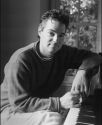 SO
Spirit (BS): Hi, can I speak to Marco Beltrami? SO
Spirit (BS): Hi, can I speak to Marco Beltrami?
Marco Beltrami (MB): This is Marco.
BS: Let me introduce myself. I'm Sergio and I'm the one who's interviewing you this morning...
MB: Okay.
BS: Then, ready when you are.
MB: I'm all set.
BS: Then we can begin...
BS: Beginning with your earliest work in TV, I was investigating around the net, and haven't been able to find anything about your first TV series (Love Street) and have found only that the second one (Land's End) aired a season...
MB: Yep, that's correct.
BS: What can you tell us about the music and those series in general?
MB: The Love Street series was connected to a show called Richard Diaries; it was kind of a cable soft-core porn thing. I only did two shows for that series...
BS: Yes I can see them in your profile...
MB: But Land's End was the first TV show that I scored entirely. It was also a cable show, I think on UPN Paramount... and that was where I really started what I'm doing today but on a weekly basis, learning a lot in the process...
BS: ...having a week to score one episode...
MB: ...less than that. Usually three or four days...
BS: And how can you find ideas in so less a time?
MB: Well, that is why it was so difficult until I figured out to just rely on instinct and not to second guessing what you're doing... In that way that show taught me a lot, and really prepared me for this business, because there are times when you can't wait for the inspiration, you have to sort of create it (laughs).
B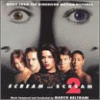 S: (laughs) Okay. S: (laughs) Okay.
BS: Well, from that you jumped into Scream...
MB: I actually did a TV movie before that called Brother's Keeper (which title I think they changed)...
BS: Yeah, I don't have it on my list.
MB: Don't worry.
BS: Then again, about Scream. How Wes Craven did approached you?
MB: Wes had an assistant and they were looking for a composer and he heard some music that I had done for one of these projects we have talked about, and he recommended me to Wes. And he told me to write a demo piece for the initial scene of the movie and bring it back in two days. So that was what I did, and he liked it. Then they had a screening in New York that worked out really well and that is how I got the job.
BS: And did Wes tell you what kind of music he wanted, or did you have total freedom to write whatever music you feel was appropriate?
MB: I pretty much composed whatever I wanted, the thing is it had to work for the picture, and for that I had the help of Wes' editor Patrick Lussier (that later went on to direct some stuff on his own). He would give me pointers on how to approach certain scenes in making them work better... an example for this should be for instance, in a scary scene... I have never worked in a scary movie before, and had never seen a scary movie before working in Scream...
BS: You had not seen any scary movies previous to your work in Scream?
MB: No, I don't like scary movies (laughs).
BS: (laughs) That's quite ironic...
MB: Yep, I know, I may be familiar with one or two Hitchcock movies (but they're more suspenseful than scary). So I really didn't know very much about them. In fact the jokes at the beginning of Scream, I didn't understand them... anyway he asked me to come up with these music where if there was a scary scene he always would tell me "to make this extra-scary you must stop the music before the big scare and when the people are jumping in their seats retake the music, that would do the job in scare a lot more the audience". So things like that I had to learn... and he was very instrumental in teaching me that stuff...
BS: I must tell you that I'm a little shocked in knowing that you didn't know anything about what has become almost your "speciality" ...
MB: Yeah, that's quite ironic... Scream was the first scary movie I have ever seen...
BS: ...and you have seen a lot since then (laughs).
MB: ...an awful lot (laughs). And I think you know I was trained at Yale School of Music, that's where I got my degree in 20th Century Concert Music, and I think a lot of the techniques were related naturally to scoring scary movies in one way or another; whether it was sound textures or exploring the capabilities of instruments...
BS: I see, and one thing that caught my attention while watching Scream for the first time was that although you achieved to come with a very unique scary movie sound (with all those twists and jumps) you also composed a very touching theme for Sidney (with the female voice almost crying) that describes perfectly the ordeal she will have to pass, not only in the first movie but in the whole trilogy...
MB: That's right.
BS: Was it your idea to come with that piece?
MB: Yeah. All the music was my ideas. The things that Wes will tell me weren't musical stuff but how to look at the scene...
BS: Okay. Jumping from the first to the second Scream movie I must ask you something that's in every soundtrack fan mouth since the day the movie first aired. How come there's a Zimmer theme (the one that is used for Dewey) in the movie instead of an original piece of music from you?
MB: They had a test screening with temp music...
BS: I knew that was what happened...
MB: And they decided to go with that theme. If you want to hear the music that I wrote is on the CD as "Dewey's Theme" or something like that...
BS: Sure, I remember it...
BS: It was a shock when first seeing the movie...
MB: Sometimes that happens and it's unfortunate.
BS: Yeah, if you remember that was the same thing that Fox did to Kamen twice (in Die Hard and Shining Through) using James Horner's Aliens music instead of his...
MB: That happens a lot...
BS: And I don't know why...
MB: If they have the temp, and in the test screening somebody in the audience comes and say "Oh, I liked it" to them that means they gotta keep it, it's kinda crazy but that's how it works...
BS: To put an end with the Scream questions, which one the three scores is you favourite?
MB: Well, I don't know (laughs)...
BS: You don't (laughs).
MB: I think probably the first because that is from where it came all the thematic material that carries out throughout the movies, and also it was my first big movie and it's very special for me...
B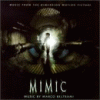 S: In 1997 you begin a collaboration that has continued throughout the years, I'm referring to you working with Guillermo del Toro. You started working with him on Mimic which resulted in a combination of all kinds of music from tango to your scary sound... and what really took my attention was the way the music passes from one style to another in a very natural way. How did you achieve that? S: In 1997 you begin a collaboration that has continued throughout the years, I'm referring to you working with Guillermo del Toro. You started working with him on Mimic which resulted in a combination of all kinds of music from tango to your scary sound... and what really took my attention was the way the music passes from one style to another in a very natural way. How did you achieve that?
MB: Well...I...it's difficult to explain... (laughs)...
BS: (laughs) Take your time...
MB: You know, I guess that's the job of the composer, to make all come together and give it an unified sound to the movie, sort of a musical identity.
BS: And how was this first work with Guillermo?
MB: Well, I was honoured to work with him in this film; but it took a little while until we reached a language that we both could agree on. It all was a process, it was a learning process working together... because... first of all he was in Toronto and I was in L.A; and he had some ideas of what the music should sound like but was very opened to my ideas as I was to his... and it took a while until we both were comfortable communicating them... I think it was definitively a very positive process...
BS: And did he give you any clues about what kind of music he wanted for the film?
MB: No, I had freedom to compose whatever I wanted...
BS: But given his Latin roots the tango theme is like homage to Guillermo's origins, isn't it?
MB: Actually the tango was his suggestion... and the only other musical suggestion was that he wanted me to use the "guiro"...
BS: Sorry, what was that?
MB: The G U I R O...
BS: And what is that exactly?
MB: It's a like a hollow tube and it's played with a stick going across it...
BS: Okay.
MB: It's a Latin instrument that has a very unique sound and he was thinking of using it as the sound of the cockroaches...
BS: A very interesting detail...
BS: Taking a huge lap in time we reach 1999, here takes place your first collaboration with Norwegian director Ole Bornedal; a TV movie called Deep Water...
MB: Well, actually my first collaboration with Ole was some pieces of additional music for Nightwatch...
BS: Oh, yes, that's right... well, apart from that you've done with him Deep Water and I am Dina, am I correct?
MB: Yes, totally.
BS: Okay. I think they're two of your best works up to date in which you achieve to find a very unique sound for both...
MB: Well, thanks for the compliment (laughs)...
BS: You're welcome (laughs)... but I haven't seen any of them (they haven't been released in Spain)...so, what can you tell me about those two projects?
MB: Well, finishing writing the two cues that I wrote for Nightwatch, Ole told me he wanted me to write the music for Deep Water, and as the movie is about a family man who gets caught in this web of deceive... and it's a very psychological movie so I felt the score I wrote should reflect that deepness...
BS: You achieved that...
MB: Thanks again...
BS: The other project with Ole was the movie I am Dina combines very different kinds of sounds that pass from Baroque music through very sensitive melodies into very impressive and powerful themes. Again I haven't had the opportunity to see the movie, so what can you tell me about it?
MB: In writing I am Dina I had the chance to work with Ole directly in Norway (north of the country where they were shooting) and there were a series of things that were very inspiring. One of them was the fact that it was summer and the sun never sets (as it's close to the North Pole) and the other one was the movie itself. I found a lot of ideas in the movie being a period piece (it takes place in the 19th Century) about a crazy Norwegian cello player... and I wanted the music to reflect some of the folk identity of the time and yet because of the state of mind of the character, it had to be very original and that's why you find so different elements throughout the music... I was very challenging and definitely one of the most fun projects that I have done... it's a pity it never showed here in the USA...
BS: Nor it did in Spain...
MB: Yeah, but you can still try to get it in DVD, because it had a Europe only DVD release...
BS: Okay, I'll try to find it...
BS: We arrive in 2000 in which you had four different projects: The Watcher, Scream 3, The Crow: Salvation and Dracula 2000...
MB: Yep, that was a loooong year... (laughs)
BS: (laughs) We are going to centre on the last two...
MB: Terrific.
BS: First on The Crow. Being the third instalment in the Crow series, you had the previous work of Graeme Revell for the first two movies. Did that fact influence you or you wrote the score without having listened to Revell's work?
MB: No, I never saw the two Crow movies so I approached this project new...
BS: So you never saw anything about the Crow...
MB: No.
BS: Then, did...
MB: Well, I actually saw the first Crow movie, now that I recall, and I did enjoy it much...but the score never stick out to me as something I wanted to copy or have in mind when composing Salvation...
BS: And being the movie an adaptation of James O'Barr's comic-books, were you influenced in some level by his work?
MB: No, I haven't read any Crow comic-books so that didn't inspire nor influenced my work in any way.
BS: Okay.
B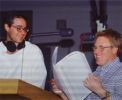 S: The other 2000 project we wanted to talk about is Dracula 2000, directed by Wes Craven's editor, Patrick Lussier. What can you tell us about the experience of working in this movie? S: The other 2000 project we wanted to talk about is Dracula 2000, directed by Wes Craven's editor, Patrick Lussier. What can you tell us about the experience of working in this movie?
MB: It was great and very easy, because as I already told you before, Patrick helped me a lot during my first big project (and after that on Mimic again)...so I knew what he was looking for and everything went very smooth...
BS: A curiosity, given the popularity of your work amongst music fans, how come there isn't any official edition of this composition?
MB: It's very simple; the film company didn't want to release a CD...
BS: Okay, but they decided a CD with songs was more appropriated...
MB: It's a shame...
BS: Yeah, because the only edition of your work is a promo...
MB: Yeah, that's right.
BS: Well, the movie did approach Dracula's myth form a different perspective...
MB: ...in which Dracula turned into what he is because he was Judas and betrayed Jesus Christ...
BS: Yeah, and that kind of approach is in your score in its' complexity and the richness of the orchestrations, giving the music a very special flavour. How did you come with the idea of using Eastern instruments?
MB: Well, the idea transpired very naturally from the fact of Dracula being Judas... and that's why his theme has these roots...
BS: Another thing that caught my attention about this work, and a thing that seems to be a constant in your work, is that you kinda like to include female voices in your scores. In Dracula's case, there's the theme for Mary. Why is that?
MB: In Dracula I don't know if it was a suggestion by the director or it was my call... you know, I think it's because in Scream (for example) the character of Sidney was the strong one, and in Dracula 2000 the strongest character is a female... and I suppose that's why I tend to use female voices, to give more strength (if possible) to those characters...
BS: But those aren't the only times you have used female voices...
MB: No...I guess I like them... (laughs)
BS: (laughs) In 2002 you worked in Resident Evil's adaptation and again with Guillermo in Blade 2...
MB: Yep, that's correct...
B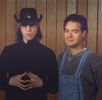 S: In the first one you worked side by side with Marilyn Manson, what can you tell us about working with him? S: In the first one you worked side by side with Marilyn Manson, what can you tell us about working with him?
MB: It was great. Marilyn approaches movies differently than me... So it was great to see a different approach to the same scene... and we worked very closely, he'll come to my studio, I'll go to his... and it general terms it was a great experience...
BS: How much did you both put into the final result?
MB: Half and half... (laughs)
BS: (laughs) In Blade 2 you worked again in a sequel, did you have the opportunity of listening to Isham's work?
MB: Yeah, I saw the first movie, but found it so different compared to the second one, that I thought Isham's work wasn't applicable in Blade 2...
BS: Yeah, both films are quite different...
MB: ...so I tried to approach it as fresh as I could.
BS: And what tone did you want to give to the Blade character?
MB: Well, I wanted a theme for the main character that was kind of funky... and there's this guy ho helped me in changing the beat of the music to accommodate my first idea... the rest of the music was approached as an orchestral score...
BS: And will you be working on Blade 3?
MB: Ahh, no...
BS: What a pity...
B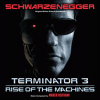 S: Last year you worked in Terminator 3 in a decision that I think has to do with the fact of James Cameron not being attached to the movie. Your approach to the music is in consequence very different from Fiedel's work... S: Last year you worked in Terminator 3 in a decision that I think has to do with the fact of James Cameron not being attached to the movie. Your approach to the music is in consequence very different from Fiedel's work...
MB: Yeah, from the very beginning Jonathan (Mostow) and I had very clear that this was a very different Terminator movie compared to the ones done before. Having that in mind we tried to play Fiedel's theme against the movie and its effect was bringing the audience back to Terminator 2... and that's pretty much why I came up with the John Connor theme coming against the motif composed for the T-X... but overall I avoided using the Terminator theme, although it appears at the end of the movie in the credits...
BS: What you can tell, by both listening to the music and watching the film, is that an oppressive sensation dominates the whole movie, except for the end when the bombs are falling driving the world into the apocalyptic state we saw in the other movies. In that scene your music varies its tone and you can find almost a hopeful feeling in it...
MB: The thing is the whole movie is about John Connor refusing his destiny and when finally at the end of the movie he picks up the radio, he's accepting it... and that's why the music plays how it does... it's a hopeful piece that tries to reflect the inner peace he has reached in finally realizing what he is here for...
BS: We finally arrive in Hellboy in which you've worked again with Guillermo...
MB: Yep.
B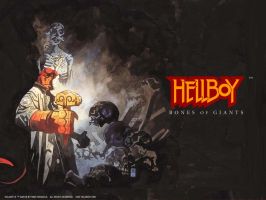 S: ...and again a movie based on a huge amount of comic-books by Mike Mignola... S: ...and again a movie based on a huge amount of comic-books by Mike Mignola...
MB: Right.
BS: ...so, did you know Mignola's work?
MB: Yeah, the producer introduced me to them and I was hooked to what I was reading, it's very unique and original...very powerful...
BS: And Mignola's vision combined with Guillermo's way of working... From what I've seen of the movie...
MB: Have you seen the movie already?
BS: Nope, it's has not been released here in Spain...
MB: Oh.
BS: ...But from what I've seen (the trailers and so) I can tell that Guillermo's vision does not differ much from Mignola's work...
MB: Yeah they are quite similar and it works really well...
BS: ...so there you have a very strong influence being Mignola's and Guillermo's vision so close, how did that fact influence you in your composition?
MB: Well, that was the key to figuring out how to do the music, and eh... have you heard the score yet?
BS: Yep.
MB: So... you know... it needed to have a unique and heroic nature to it, but being different to other ordinary superheroes comic-books my approach to it was based on instrumentation using the baritone guitar and the horns that let this sort of noble quality to the music. The question was how to represent Hellboy's character musically and be accurate to the movie...
B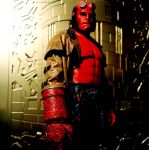 S: A-ha, and did Guillermo suggest that you should wrote a different theme from almost every character in the movie, or was it your idea? S: A-ha, and did Guillermo suggest that you should wrote a different theme from almost every character in the movie, or was it your idea?
MB: When we first talked about the movie, he said "do every one" and I spoke to him telling that it'd be good to approach the movie with a heavily thematic music... almost like an opera where every character has different themes... and I guess I started out from that point and come out with different themes...
BS: And so you have Hellboy's theme, Abe's theme, Liz's theme, the Love theme...
MB: ... There's Rasputin's theme, the Nazi's theme...
BS: A very martial theme, the last one...
MB: Yep, and professor Broom has also a theme... the waltz ...yeah, there's quite a few, I think there're six different themes... and this is new for me, I usually do not approach a movie with such a variety of themes, and it was very fun doing this movie...
BS: ...and were you comfortable in doing such variety of themes?
MB: Yeah, I think it was a lot of fun...
BS: One last question about Hellboy.
MB: Shoot.
BS: I wanted to comment with you the power that transpires from "Father's
Funeral" theme. When I first listened to it I was touched by it, what was your inspiration in composing the theme?
MB: (ATTENTION SPOILER) Just the movie. I think it was Guillermo's idea to use a waltz for professor Broom and it's a very powerful scene when he dies and Hellboy comes to the funeral...
BS: Well, one quick last question, you're working now on Cursed, Craven's approach to the werewolf myth...
MB: Has not begun yet...
BS: A-ha, and what do you think it will be your music to the movie, have you something in mind?
MB: Well, I've seen some footage and I think the music will be a combination of electronic manipulation and orchestra...
BS: Okay.
BS: Well, Marco, it's been a pleasure...
MB: A pleasure from my behalf too. Feel free to call again when Cursed is released...
BS: Okay, thank you very much. Take care.
MB: Good luck and thanks for the interview. Bye.
For more info on composer Marco Beltrami, visit www.marcobeltrami.com
Interview carried by Sergio Benítez and Óscar Giménez.
|





